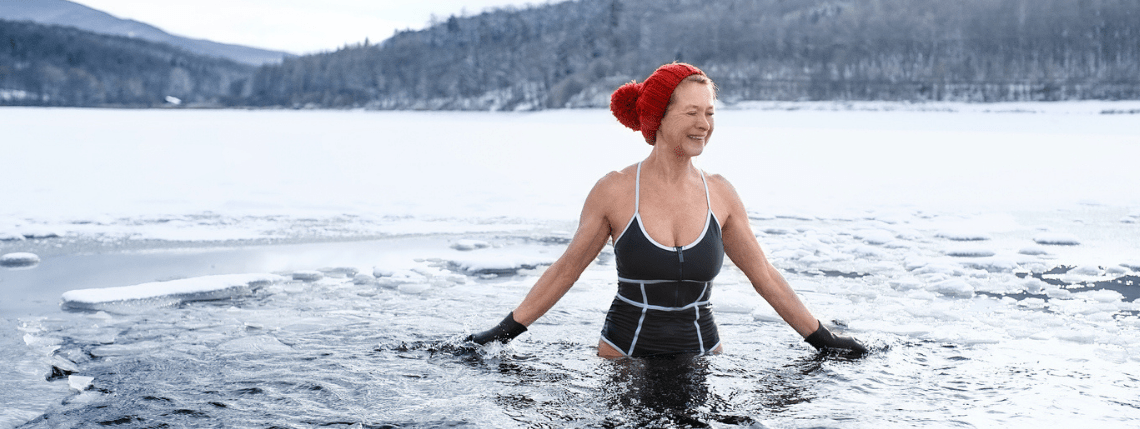Matthew J Legg, founder and head PT at PSYCH STRENGTH, dives into the reasons why he loves cold-water swimming.
Don’t get me wrong, when my clients first told me they were off for a cold-water swim on a freezing December morning I laughed. The idea of voluntarily putting myself in such a seemingly brutal environment did not appeal to me one bit. But somehow, four weeks later, I found myself standing on the edge of the lake in nothing but my swimming shorts. The initial gasp, the rapid breathing and the rise in heart rate and blood pressure caused my body to respond like never before. When submerged in the cold water, the vessels supplying blood to the skin contract (vasoconstriction), limiting blood flow to the surface, meaning a concentrated flow of blood can be directed to the deep tissue and vital organs, allowing the body to maintain core temperature1.
Although I was shivering and very cold, the sole thought running through my mind was about controlling my breathing and reducing my heart rate. Every single worry, whether it’s work, relationships or anything else escapes your mind in this moment and you are 100% focused on the here and now.
Starting cold-water swimming for the first time during a British winter is probably the definition of ‘getting chucked in at the deep end’. But the challenge that presented itself brought on a whole array of emotions and responses which were like no other. Every sense of anxiety was met with a sense of excitement; every ounce of hatred was met with an overriding feeling of euphoria. And, from that very moment, that is where my love for cold-water swimming blossomed.
Taking it back over 2000 years, the very first form of research shows that exposure to these relatively extreme conditions stimulated a physiological response which aided the relief of fatigue and brought ‘good health’.2
Throughout one’s body, a vast variety of hormones constantly fluctuates depending on the environments and exposures faced on a daily basis. Catecholamines are a vital group of hormones which can drastically alter one’s ability to adapt to stress. The collection of catecholamines, which include dopamine, norepinephrine and epinephrine, are shown to be stimulated when the body is exposed to cold water.3
In a recent study4, a 24-year-old woman with symptoms of severe depression and anxiety did not respond to conventional therapies. For this purpose, an intervention comprising a weekly programme involving cold-water swimming was developed. This resulted in an immediate improvement in mood and a sustained and gradual reduction in the symptoms of depression. Ultimately, her medication was reduced and then, finally, after one year of therapy with cold-water swimming, she was medication free.4
What this study shows is that, by effectively rebalancing these hormones within the human body, its ability to tolerate and ultimately adapt to stress becomes far greater, therefore making the relatively novel and inexpensive intervention a possible treatment for depression5.
Not only does the physical effect of the cold water seem to help our mood but surrounding ourselves in the natural world itself brings a whole magnitude of benefits. Natural environments elicit far greater calming responses than the modern ‘developed’ world in which many of us live. It’s been shown that exposure to these surroundings mediates the negative side-effects of stress, as well as enhancing positive emotions6.
With hundreds of studies researching the effects and benefits of natural exposure, including reduced stress, depression, anxiety, aggression, obesity, diabetes, better sleep, improved mental health and improved immune function just to name a few7, it appears that it truly supports the human predisposition to immerse oneself in the natural environment.
While there are reported to be many benefits associated with cold-water swimming, by its very nature, it’s natural. The environment can vary on an hourly basis depending on the weather, which can present undesirable and sometimes unsafe conditions.
A general rule of thumb is to receive medical advice and do your own research before starting cold-water swimming; it’s always better to be safe than sorry. You can also check out local swimming groups, which not only aim to educate but also to encourage people to take the plunge.
One of the main reasons I got into cold-water swimming was that I needed a fresh start. I needed a challenge and I needed to find new ways to elevate my own mood after what was an incredibly tough year. And now I’ve found myself something that makes me feel alive and I absolutely love it.
If there’s any advice I could have given myself before initially disregarding cold-water swimming, it would have been: “Be adventurous, be brave and don’t be afraid to step outside your comfort zone. That’s where the magic happens.”
Author Bio:

Matt Legg is the founder and head Personal Trainer at Psych Strength LTD. The health and fitness brand Psych Strength was created to educate, alleviate and eradicate the stigma that surrounds mental health through the power of sport. With qualifications including: HNC Sport & Exercise Science, Personal Training, Mental Health awareness for sport and physical activity, and training in depression counselling, it’s safe to say that Matt has a passion for sharing his knowledge in health, mental health and fitness.
- The Outdoor Swimming Society (2021), Risk of Cold Water, https://www.outdoorswimmingsociety.com/risks-cold-water/, accessed on 7 October 2021.
- Knechtle B, Waskiewicz Z, Victor Sousa C, Hill L, Nikoladis P (2020), Cold Water Swimming – Benefits and Risks: A narrative review, Cold Water Swimming—Benefits and Risks: A Narrative Review (nih.gov), accessed on 7 October 2021.
- Dulac S, Quirion A, DeCarufel D, LeBlanc J, Jobin M, Cote J, Brisson GR, Lavoie JM, Diamond P (1987, 2008), Metabolic and Hormonal Responses to Long-Distance Swimming in Cold Water, Thieme E-Journals – International Journal of Sports Medicine / Abstract (thieme-connect.com), accessed on 7 October 2021.
- van Tulleken C, Tipton M, Massey H, Harper M (2018), Open Water Swimming as a Treatment for Major Depressive Disorder, https://pubmed.ncbi.nlm.nih.gov/30131418/, accessed on 7 October 2021.
- Shevchuk NA (2007), Adapted Cold Shower as a Potential Treatment for Depression,
https://www.sciencedirect.com/science/article/abs/pii/S030698770700566X, accessed on 7 October 2021.Nasar JL (2014), The Role of Nature in Coping with Psycho-Physiological Stress: A Literature Review of Resorativeness, https://www.ncbi.nlm.nih.gov/pmc/articles/PMC4287696/, accessed on 7 October 2021.
Frumkin H, Bratman G, Breslow S, Cochran B, Khan Jr P, Lawler J, Levin P, Tandon P, Varanasi U, Wolf K, Wood S (2017), Nature Contact and Human Health: A Research Agenda,
https://www.ncbi.nlm.nih.gov/pmc/articles/PMC5744722/, accessed on 7 October 2021.







